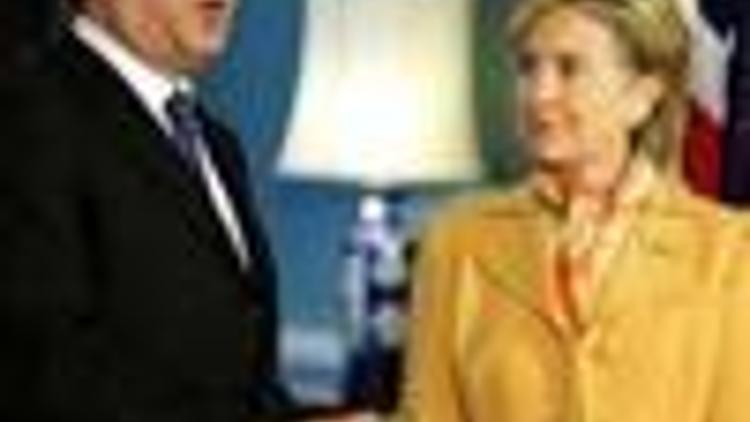US pushes for a Caucasus solution
Güncelleme Tarihi:

Hürriyet Daily News
Oluşturulma Tarihi: Mayıs 07, 2009 00:00
ISTANBUL - Armenian foreign minister Edward Nalbandian, his Azeri counterpart Elmar Mammedyarov meet with their US counterpart Hillary Clinton in separate meetings on the eve of a key meeting today between the leaders of the two neighboring countries
U.S. Secretary of State Hillary Clinton met Tuesday with the foreign ministers of two warring Caucasus neighbors to push for a solution to their territorial dispute, which killed more than 30,000 people some 15 years ago.
Clinton separately met with her visiting Armenian counterpart, Edward Nalbandian, and Azerbaijani Foreign Minister Elmar Mammedyarov at the State Department on the eve of a key meeting between the leaders of the two neighboring countries.
Backed by Armenia, ethnic Armenian separatists seized control of the Nagorno-Karabakh region and part of Azerbaijan proper in 1993, in the wake of the former Soviet Union's 1991 disintegration. The war forced up to 2 million people to flee their homes. Though there is a fragile cease-fire in place, a peace agreement has never been signed.
In late April, Turkey and Armenia agreed in principle to normalize relations, but a solution to the Nagorno-Karabakh conflict is a key element in the deal's implementation.
Azerbaijani President Ilham Aliyev and Armenian President Serj Sarkisian are set to meet in Prague today on the sidelines of an international European Union-related meeting. Turkish President Abdullah Gül is also expected to meet separately with his two fellow leaders at the event.
Armenia thanks the US
"I would like to use this opportunity to express our thanks to the administration of the United States, to Madam Secretary and to the State Department for their constant efforts to help support the normalization process with Turkey and a peaceful settlement of the Nagorno-Karabakh conflict," Nalbandian told reporters before his meeting with Clinton.
Clinton pledged to assist Armenia in its "continued development and aspirations."
Later, before meeting Mammedyarov, Clinton said that oil- and natural-gas-rich Azerbaijan had a very strategic location that was "regionally and globally important."
Mammedyarov said his meeting with Clinton would move forward "the strategic partnership with the United States."
A Turkish-Armenian road map agreed to last month called for, among other things, the opening of the countries’ land border, closed in 1993 by Ankara in response to the Armenian occupation of Azerbaijani lands.
For that to happen, Turkey wants to see solid developments toward the resolution of the Nagorno-Karabakh conflict.
U.S. President Barack Obama says he strongly supports the Turkish-Armenian reconciliation process; in a statement in late April, he declined to characterize the World War I-era killings of Armenians in the Ottoman Empire with the controversial term "genocide."
Clinton separately met with her visiting Armenian counterpart, Edward Nalbandian, and Azerbaijani Foreign Minister Elmar Mammedyarov at the State Department on the eve of a key meeting between the leaders of the two neighboring countries.
Backed by Armenia, ethnic Armenian separatists seized control of the Nagorno-Karabakh region and part of Azerbaijan proper in 1993, in the wake of the former Soviet Union's 1991 disintegration. The war forced up to 2 million people to flee their homes. Though there is a fragile cease-fire in place, a peace agreement has never been signed.
In late April, Turkey and Armenia agreed in principle to normalize relations, but a solution to the Nagorno-Karabakh conflict is a key element in the deal's implementation.
Azerbaijani President Ilham Aliyev and Armenian President Serj Sarkisian are set to meet in Prague today on the sidelines of an international European Union-related meeting. Turkish President Abdullah Gül is also expected to meet separately with his two fellow leaders at the event.
Armenia thanks the US
"I would like to use this opportunity to express our thanks to the administration of the United States, to Madam Secretary and to the State Department for their constant efforts to help support the normalization process with Turkey and a peaceful settlement of the Nagorno-Karabakh conflict," Nalbandian told reporters before his meeting with Clinton.
Clinton pledged to assist Armenia in its "continued development and aspirations."
Later, before meeting Mammedyarov, Clinton said that oil- and natural-gas-rich Azerbaijan had a very strategic location that was "regionally and globally important."
Mammedyarov said his meeting with Clinton would move forward "the strategic partnership with the United States."
A Turkish-Armenian road map agreed to last month called for, among other things, the opening of the countries’ land border, closed in 1993 by Ankara in response to the Armenian occupation of Azerbaijani lands.
For that to happen, Turkey wants to see solid developments toward the resolution of the Nagorno-Karabakh conflict.
U.S. President Barack Obama says he strongly supports the Turkish-Armenian reconciliation process; in a statement in late April, he declined to characterize the World War I-era killings of Armenians in the Ottoman Empire with the controversial term "genocide."

